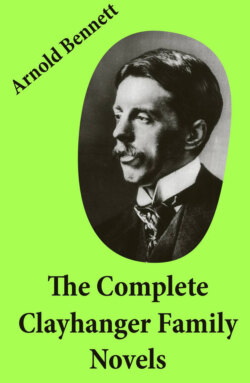Читать книгу The Complete Clayhanger Family Novels (Clayhanger + Hilda Lessways + These Twain + The Roll Call) - Arnold Bennett - Страница 177
На сайте Литреса книга снята с продажи.
Chapter 1. After a Funeral.
ОглавлениеTable of Contents
Four and a half years later, on a Tuesday night in April 1886, Edwin was reading in an easy-chair in his bedroom. He made a very image of solitary comfort. The easy-chair had been taken from the dining-room, silently, without permission, and Darius had apparently not noticed its removal. A deep chair designed by some one learned in the poses natural to the mortal body, it was firm where it ought to be firm, and where it ought to yield, there it yielded. By its own angles it threw the head slightly back, and the knees slightly up. Edwin’s slippered feet rested on a hassock, and in front of the hassock was a red-glowing gas-stove. That stove, like the easy-chair, had been acquired by Edwin at his father’s expense without his father’s cognisance. It consumed gas whose price swelled the quarterly bill three times a year, and Darius observed nothing. He had not even entered his son’s bedroom for several years. Each month seemed to limit further his interest in surrounding phenomena, and to centralise more completely all his faculties in his business. Over Edwin’s head the gas jet flamed through one of Darius’s special private burners, lighting the page of a little book, one of Cassell’s “National Library,” a new series of sixpenny reprints which had considerably excited the book-selling and the book-reading worlds, but which Darius had apparently quite ignored, though confronted in his house and in his shop by multitudinous examples of it. Sometimes Edwin would almost be persuaded to think that he might safely indulge any caprice whatever under his father’s nose, and then the old man would notice some unusual trifle, of no conceivable importance, and go into a passion about it, and Maggie would say quietly, “I told you what would be happening one of these days,” which would annoy Edwin. His annoyance was caused less by Maggie’s ‘I told you so,’ than by her lack of logic. If his father had ever overtaken him in some large and desperate caprice, such as the purchase of the gas-stove on the paternal account, he would have submitted in meekness to Maggie’s triumphant reminder; but his father never did. It was always upon some perfectly innocent nothing, which the timidest son might have permitted himself, that the wrath of Darius overwhelmingly burst.
Maggie and Edwin understood each other on the whole very well. Only in minor points did their sympathy fail. And as Edwin would be exasperated because Maggie’s attitude towards argument was that of a woman, so would Maggie resent a certain mulishness in him characteristic of the unfathomable stupid sex. Once a week, for example, when his room was ‘done out,’ there was invariably a skirmish between them, because Edwin really did hate anybody to ‘meddle among his things.’ The derangement of even a brush on the dressing-table would rankle in his mind. Also he was very ‘crotchety about his meals,’ and on the subject of fresh air. Unless he was sitting in a perceptible draught, he thought he was being poisoned by nitrogen: but when he could see the curtain or blind trembling in the wind he was hygienically at ease. His existence was a series of catarrhal colds, which, however, as he would learnedly explain to Maggie, could not be connected, in the brain of a reasonable person, with currents of fresh air. Maggie mutely disdained his science. This, too, fretted him. Occasionally she would somewhat tartly assert that he was a regular old maid. The accusation made no impression on him at all. But when, more than ordinarily exacerbated, she sang out that he was ‘exactly like his father,’ he felt wounded.
